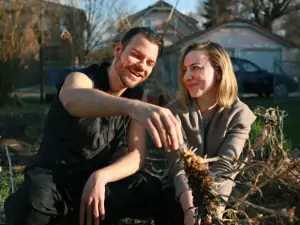 Today, it seems almost impossible that a person can live in a big city without purchasing anything. City dwellers are constantly surrounded with many possible kinds of goods, services, and entertainment. Without even realizing it, people tend to waste significant amounts of money on almost worthless purchases, like drinks at a bar, or cinema tickets, or shopping. However, two people from Calgary, Canada, managed not only to realize it, but also broke free from the circle of infinite consumption. Their experiment lasted a year, and was called the Buy Nothing Year.
Today, it seems almost impossible that a person can live in a big city without purchasing anything. City dwellers are constantly surrounded with many possible kinds of goods, services, and entertainment. Without even realizing it, people tend to waste significant amounts of money on almost worthless purchases, like drinks at a bar, or cinema tickets, or shopping. However, two people from Calgary, Canada, managed not only to realize it, but also broke free from the circle of infinite consumption. Their experiment lasted a year, and was called the Buy Nothing Year.

✅ AI Essay Writer ✅ AI Detector ✅ Plagchecker ✅ Paraphraser
✅ Summarizer ✅ Citation Generator
Geoffrey Szuszkiewicz and Julie Phillips, an accountant and a communication adviser, started to calculate their profits and expenditures; at some point, they realized they were spending a lot of money on objects and services they did not need. For instance, Geoffrey would spend about $150 monthly (Julie would spend $250) on a haircut in a salon, and Julie would regularly go to restaurants and bars with her friends (Forbes).
So, to avoid unnecessary expenditures, Geoffrey and Julie started to live together (she rented a room in his apartment), and phased out all objects they used to spend money on. Chemicals for household chores, gas, dining out, getting haircuts in salons, and other activities and purchases people in Calgary get used to making turned out to require huge amounts of money. Geoffrey and Julie sought for alternatives; for example, they walked or biked instead of using their cars. Gradually, they learned how to live without purchasing items that almost any citizen considers necessary; they only went to grocery stores to buy food.
When the Buy Nothing Year project had run to its end, Geoffrey and Julia calculated their savings. It turned out during the year, Geoffrey had saved $42,300. Julie, in her turn, had saved $13,800. Both of them say they have obtained many useful skills throughout the year: to live only on what is necessary, frugality, managing money, and other useful traits that will help them care about money less, and focus on what they like doing.
Geoffrey’s and Julie’s experience demonstrates how even living in a developed country, where advertising and consumption have reached its peak, a person can still remain mindful and maintain control over his or her expenditures. Social responsibilities and communication seem to be closely connected with spending money—dining out with friends, sitting in bars, going to the cinema, and so on and thus refusing them may be difficult. But, the outcomes are worth the risk.
References
“The Buy Nothing Year: How Two Roommates Saved More than $55,000.” Forbes. Forbes Magazine, n.d. Web. 30 Sept. 2014.
Follow us on Reddit for more insights and updates.





Comments (0)
Welcome to A*Help comments!
We’re all about debate and discussion at A*Help.
We value the diverse opinions of users, so you may find points of view that you don’t agree with. And that’s cool. However, there are certain things we’re not OK with: attempts to manipulate our data in any way, for example, or the posting of discriminative, offensive, hateful, or disparaging material.
Comments are closed.